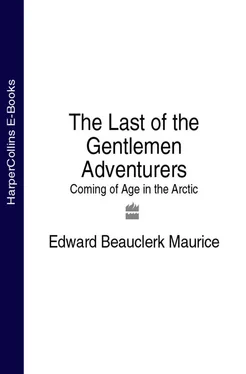Map Map Praise Dedication Foreword Part One: The Boy Chapter I Chapter II Chapter III Chapter IV Chapter V Chapter VI Part Two: Issumatak Chapter VII Chapter VIII Chapter IX Chapter X Chapter XI Chapter XII Chapter XIII Chapter XIV Chapter XV Epilogue About the Author Copyright About the Publisher
Praise Praise Dedication Foreword Part One: The Boy Chapter I Chapter II Chapter III Chapter IV Chapter V Chapter VI Part Two: Issumatak Chapter VII Chapter VIII Chapter IX Chapter X Chapter XI Chapter XII Chapter XIII Chapter XIV Chapter XV Epilogue About the Author Copyright About the Publisher
for The Last of the Gentlemen Adventurers :
‘This is a great book about life at remote bases in Canada’s far north as seen by a young English boy who went there by himself to see the world and got more than he could ever have bargained for. Beautifully written’ SIR RANULPH FIENNES
‘A beautifully unadorned, homespun tale, with a lack of self-consciousness rare in travel literature … Maurice recalls this faraway time without recourse to judgment of the alien world that embraced him, and no doubt his ease with, and openness to, the world were qualities that the Inuit were quick to discern in him … The book’s greatest asset … is [a] kind of purity. I was charmed’ BENEDICT ALLEN, Independent on Sunday
‘Maybe [Beauclerk Maurice] was exceptional, but the charm of his book lies in its modesty: he makes no claims for himself. His concern was to make a record of some amazing adventures and a vanishing way of life; these are woven into an eye-opening narrative that is suffused with kindliness and an attitude to growing up more restrained but more humane than that prevailing today. A gentleman adventurer, indeed’
Times Educational Supplement
‘Unlike many of its contemporaries, The Last of the Gentlemen Adventurers is not a tale of machismo by bearded explorers. In 392 pages of unadorned prose, it manages to live up to its title and simultaneously throw new light on the polar regions … [Maurice] writes sparsely, preferring to let the landscape and people speak for themselves. His story weaves Inuit history, culture and beliefs, while all the time aware of the impact of the white man on the surroundings … An important memoir of a time not so long ago, when the world was unexplored … One to keep on your shelf and dip into again and again’
Sunday Business Post
Dedication Dedication Foreword Part One: The Boy Chapter I Chapter II Chapter III Chapter IV Chapter V Chapter VI Part Two: Issumatak Chapter VII Chapter VIII Chapter IX Chapter X Chapter XI Chapter XII Chapter XIII Chapter XIV Chapter XV Epilogue About the Author Copyright About the Publisher
For a much-loved husband and father whose adventurous start to paid employment has inspired us all to take up life’s challenges.
The stories that follow have filled many happy family times together and we hope this book will ensure that others also can share in a young boy’s dream.
Pat, Jane, Sally and Victoria Maurice
WHITE ESKIMO
FOREWORD Foreword Part One: The Boy Chapter I Chapter II Chapter III Chapter IV Chapter V Chapter VI Part Two: Issumatak Chapter VII Chapter VIII Chapter IX Chapter X Chapter XI Chapter XII Chapter XIII Chapter XIV Chapter XV Epilogue About the Author Copyright About the Publisher
by Lawrence Millman
EDWARD BEAUCLERK MAURICE almost did not go to the Arctic. His Hudson’s Bay Company recruiter, George Binney, thought the seventeen-year-old boy’s dark looks suggested ‘Eastern blood’, and in his not necessarily unbiased opinion, recruits with even a smattering of Asian, Semitic or Indian blood (Binney was at least egalitarian in his prejudices) did not have the right stuff to be fur traders in the Canadian North. If Maurice’s headmaster hadn’t assured Binney that the boy’s brother was ‘conspicuously fair’, Edward probably would have emigrated to New Zealand with the rest of his family, and bookshelves would have been deprived of this remarkable memoir.
Yet if it wasn’t for Binney, Maurice wouldn’t even have been considered for employment with the Hudson’s Bay Company. For the HBC – to use its popular abbreviation – traditionally looked to the Highlands and Islands of Scotland for recruits. The Company’s thinking went something like this: a Scotsman, preferably a poor one, would be thrifty; he would be accustomed to uncomplaining servitude; he would be used to a rotten climate; and, as a Celt, he would be not unlike the primitive people with whom he’d be trading. But Binney felt the Company needed educated recruits, what today might be called managerial types, if it was to keep apace with modern times. So he turned his attention to England and to public schools like the one in Sussex that Maurice was attending.
A more unlikely candidate for the northern wilds would be difficult to imagine. Maurice was naïve even for his age, his childhood had been quite sheltered, and his experience of rotten climates seems to have been limited to the draughty corridors of his school. An HBC evaluation refers to him as being ‘inclined more to indoor rather than outdoor work’. But sometimes the least likely person turns out to be the most likely one. After all, Robert Peary was a mama’s boy and his North Pole adversary, Frederick Cook, worked as a milkman.
Maurice started out as an apprentice clerk at the Pangnirtung Post on Baffin Island. Nowadays Pang, as it’s called, is a mecca for Arctic tourists, with hotels, souvenir shops, and even an interpretive centre. But in 1930 it was hardly more than a huddle of clapboard houses surrounded by Eskimo (the then current name for the Inuit) tents. As befits such a high-latitude settlement, there were no trees other than those of the dwarf variety. A lad who’d arrived here from England’s green and pleasant land might reasonably feel that he’d fetched up very close to the bleak end of the world (the actual end of the world was the HBC’s Payne Bay Post, where it took trader Charles Duncan two years to receive a telegram notifying him that his father had died). But not Maurice: he was exhilarated.
According to the oft-repeated joke, the initials ‘HBC’ stand for ‘Here Before Christ’. But the Hudson’s Bay Company didn’t actually establish its first post in the Canadian Arctic until 1908 (the first non-Arctic post, Rupert House, dates from 1670). This relatively recent arrival in North America’s attic can be attributed to two factors: (1) the over-harvesting of fur-bearing animals, especially beavers, down south and (2) the new global demand for fur from a more northerly animal. The northerly animal in question was the white fox ( Alopex lagopus ).
Before the HBC came, the Baffin Eskimos used the fur of the white fox primarily to wipe their babies’ bottoms. They must have thought the White Man’s obsession with this fur a little peculiar, at least until they became obsessed with it themselves. For a white fox pelt was virtually the only item they could trade for rifles, bolts of cloth, tools, sugar and tea. In a decent fox year, an Eskimo trapper would have enough trade goods to fill his tent; in a bad fox year, he would owe his soul to the Company store. Either way, that trapper would be at odds with his own past. In the words of anthropologist Diamond Jenness, ‘the commercial world of the White Man caught the Eskimo in its mesh, destroyed their self-sufficiency and independence and made them economically its slaves.’
The Company took a paternalistic attitude toward the Eskimos, the better to increase its profits. George Binney (yes, the same George Binney who was worried about Maurice’s dark looks) summed up this attitude in The Eskimo Book of Knowledge , the official HBC guide for Eskimo trappers, when he wrote: ‘Our trader has learned to bestow the care of a father upon you and your children.’ The implication is that father, or the Company, knows best, and the Eskimo knows least.
Читать дальше












